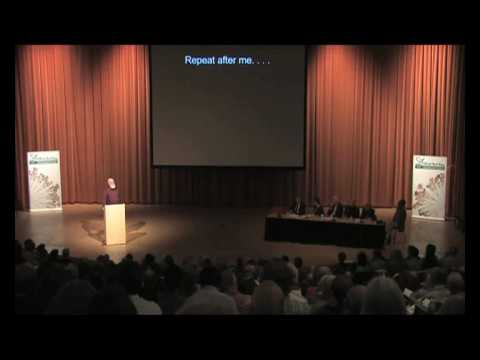Cambridge University
Darwin and the evolution of why?
Professor Daniel C Dennett (Centre for Cognitive Studies, Tufts University, Medford, Massachusetts, USA)
Summary: We human beings are the only living things that can represent, transmit and criticize reasons for doing things and making things. This creates a perspective for us that we can then use to interpret all the rest of the life on the planet, cautiously. Mother natures reasons are not just like our reasons. It is our evolved capacity to ask, and answer, Why questions that gives us, in the end, the kinds of free will worth wanting, the kinds that no other animal has.
Source




@GodTheHypothesis You claim that "the assertion that the big bang was the absolute origin of the universe is one that has no evidence". I am sure you must have heard of the Borde-Guth-Vilenkin Theorem? They were able to prove that any universe, which is on average expanding throughout its history, cannot be infinite in the past but must have a past space-time boundary; and this holds independently of any physical description of the early universe. Therefore, even if the "Big Bang" is not the…
@GodTheHypothesis … the absolute beginning, even a multi-verse must have an absolute beginning. So, according to Borde, Guth and Vilenken the universe cannot be a necessary being.
Dawkins- because he is ignorant of theology- is unaware that the great theologians of the Church understood God as being ultimately simple: that is, a mind which is not composed of parts. Remember to distinguish the simplicity of the mind and the minds thoughts (which can be complex). I refer you to Aquinas.
@GodTheHypothesis It is interesting that atheists are now decrying the idea of a necessary being when it looks quite likely that the universe is not the necessary being that atheists once assumed it to be. The point is that there has to be something whose non-existence is impossible, otherwise you have the problem of an infinite regress (look at Hilbert's proofs that actual infinites are impossible) or that the universe just miraculously produced itself, which defies all logic and sense.
@GodTheHypothesis I really deplore the flase comparisons between mythological gods such as Zeus and the God of classical theism. If Zeus existed he would be a finite creature within the universe (as all the storys about him suggest); but what we mean by God is that than which nothing greater can be conceived, the reason there is something rather than nothing. There are no arguments for the existence of Zeus nor could there be; but there are for God as defined by me.
@GodTheHypothesis What I find most extraordinary about modern atheists is that they seem to believe (what a leap of faith this is) that anyone who believes in God must be closing his eyes to all evidence and common sense, as Dawkins asserts. What blind faith you atheists often possess! Do you really think that Polkinghorne, F Collins, A McGrath, A Plantinga, K Ward and so on, don't possess good reasons for adopting the beliefs they do? Its just ridiculous.
@bayreuth79
Hilbert proved that actual infinities are impossible?? Ok so as a mathematician- I now say WHATTTT? You can't "prove" things about nature because the universe isn't in axiomatic system- or we have no way of knowing if it is. So lets hear this "proof"!
@bayreuth79
Well that's just semantics. It's true that the concept of this kind of timeless spaceless God is a modern invention but you could easily just suggest that actually the character of Zeus was actually referring to your necessary being which wasn't within time and space. If you're too pedantic to accept Zeus, just use another God- it's not hard to imagine one.
@bayreuth79
Ok well now you've given up on the actual arguments and just resorted to yet more argument from authority- yes yes many smart people have believed in God. Congratulations- it must be true! I'm slowly losing patience, I thought you actually had some genuine arguments.
@GodTheHypothesis I suppose u also wouldn't like to live in a society with laws and punishment for law breakers.
@GodTheHypothesis You know as well as I do that I was using the term "prove" equivocally, not in its strict mathematical sense.
I suggest you read David Hilbert's 1926 paper "On the Infinite". This is what David Hilbert says, "The infinite is nowhere to be found in reality. It neither exists in nature nor provides a legitimate basis for rational thought. The role that remains for the infinite…is solely that of an idea…". There are all kinds of paradoxes which result from real infinities.
@GodTheHypothesis No, you are completely wrong. The idea of a "timeless spaceless God" is not "a modern invention". With respect, this reveals your ignorance of philosophy and theology. The idea of that than which nothing greater can be thought (God) is already present in the work of Plato, Aristotle and Cicero (to name but a few). Augustine and Thomas Aquinas developed the most sophisticated conceptions of this timesless spaceless reality, so its not 'ad hoc' at all.
@GodTheHypothesis What do we mean by Zeus or Odin or any of the other mythological gods? We surely mean an anthropomorphic being with tremendous power (even the supreme being) who occupies time and space and occasionally interacts with mortals. This is not even remotely analogous to what classical theists mean by God, so its quite useless to compare them. God is by definition sui generis (that is, utterly unique), unlimited in all perfections, beyond time and space, etc.
@GodTheHypothesis You misunderstand. I am not saying- and if you look at what I actually wrote you will discover this- that because intelligent people believe in God therefore God exists. I never said that, so please don't have the temerity to claim that I did. What I was reacting to is that "new atheist" absurdity that all religious believers are simply closing their eyes to the evidence, as though people like John Polkinghorne and Alvin Plantinga are just ignorant "faith heads". Its ridiculous
@bayreuth79
Well I'm not sure who actually said that these people are ignorant faith heads. I certainly didn't and I don't recall any of the "4 horsemen" doing so. Although in response to this accusation, I'd actually point out the fact that this supposed "evidence" for god is agreed upon by hardly any of the scientific elite, certainly DOES act as an authority against it.
@GodTheHypothesis Richard Dawkins, C Hitchens and Sam Harris have all spoken of religious people as if they were hopelessly stupid and woefully ignorant- not to mention childish and superstitious. It was Dawkins who coined the perjorative term "Faith-heads" as a particularly nasty comparison with "crackheads". The fact is that Dawkins and his ilk are enraged that Modernity's expectation of the immanent demise of religion has proved a false hope- if anything, religion is growing, not fading.
@GodTheHypothesis Science in itself cannot answer the question "Does God exit?", so it is strictly irrelevant what the so-called scientific elite think about this particular question. I think we can both agree that science studies physical processes and as such, it cannot adjudicate on a metaphysical question. That is not to say that philosophers and theologians cannot use evidence from science to either bolster or undermine theism, but science qua science is restricted to the physical.
@GodTheHypothesis In my experience most atheists are unwittingly logical positivists, which as you probably know is an outdated epistemology embraced by virtually no serious contemporary philosophers. Do you subscribe to this philosophy? It is sometimes referred to now as "Scientism"; I would describe Dawkins and his ilk as subscribing to this narrow and outdated epistemology.
@bayreuth79
Well hitchens talked about everyone who disagreed with him like that- so I'm not sure you could read much into that. As for Dawkins, he does specifically say that his book is aimed at people who are already nearly atheists rather than the religious. So the fact that you're annoyed about it is exactly what he wanted- he didn't write the book for YOU. He's also been hugely successful- more than any of the others. Religion is only growing in poor and uneducated places!
@bayreuth79
Well science can't currently answer the question of whether God exists. I don't see any reason to think that it couldn't in principle. I'd also add that theology and philosophy have failed to answer the question. If they had, we'd all be theists!!!
Well no you can't use the idea of evidence and claim it's theology or philosophy. Evidence is the domain of science. Saying something is "evidence" for God doesn't make it so. That's why we have the scientific method.
@bayreuth79
I don't think I've heard any of the atheists claim any kind of epistemology like that. Labelling someone with an epistemology is a classic way of trying to just show that they're somehow fallacious- it's such a see-through and boring trick. I don't think many scientists bother with such philosophical absolutes. The only epistemology I think "we" would agree to- is that the only reliable way to demonstrate a scientific claim is through empiricism.
@bayreuth79
Erm no, in that quote he was referring to the religious extremists when they're in the position to cause great harm- like it being ethical to kill osama bin laden if we could've. You do get the silver medal in quote-mining though!
@bayreuth79
Well no, when you say "prove" in mathematics, it does have a specific meaning. The fact that hilbert didn't think infinity could exist is not a proof that it couldn't. He's not even alone. Quite a few mathematicians agree. The problem is, a lot of them wouldn't!!! I suggest watching the BBC horizon episode about infinity- they ask a selection of mathematicians if they think the universe could be infinite. Some say yes, most say "I don't know", maybe 1 of them says no.
@GodTheHypothesis It makes no difference for whom Richard Dawkins wrote his rather embarrassing book "The God Delusion". The fact that he belittles all religious people in his books, articles and debates bespeaks his failure to engage seriously with intelligent and thoughtful religious thinkers, such as Alvin Plantinga (who is considered to be one of the finest philosophers in the contemporary world). You cannot refute something by setting up strawmen arguments- something hes fond of.
@GodTheHypothesis This sounds like Western imperialist arrogance to me. "Religion is only growing in poor and uneducated places", so people in places like South America are basically ignorant and need a healthy dose of Western style rationalism?! Please, give me a break!
Besides, even in Western countries religion is still a potent force, it is just that people are no longer expressing their religiosity by attending Church and other institutional forms of religion.
@GodTheHypothesis Science can NEVER adjudicate on the question of God for the reasons I have already given. If science deals with physical processes of change within the universe, then how on earth is science going to be able to adjudicate on the question of a non-physical, non-temporal, non-spacio reality. Pls answer that question.
There are good reasons to believe in the existence of "that than which nothing greater can be thought". The problem you have is that your epistemolgy is scientism
@GodTheHypothesi This is a ridiculous comment! Everyone has either an explicit or implicit epistemology, that is how we make decisons regarding what to believe.
Interestingly, you then go on to admit to being an empiricist, which is itself an outmoded and rather narrow epistemology.
@GodTheHypothesis You obviously haven't read the quote in context; please get the book and do so.
Sam Harris also asks us to contemplate nucking the whole of the Middle East. Rather disturbing, I'd say.
@GodTheHypothesis I suggest that you read David Hilbert's "On Infinity". It is not just a question of what some mathematicians say, the Borde, Guth, Vilenken Theorem prohibits an infinite universe (or multiverse for that matter). Besides, I do not trust the BBC as they have a secular agenda. That is well known and uncontroversial.
@bayreuth79
Well yeah it is just a question of what mathematicians say because there remains no certain answer. The BGV theorem doesn't prohibit an infinite universe at all. It prohibits a past eternal spacetime, that's all. The inflationary theory that it's based on usually implies an infinite universe in the future too (so the existence of infinity is implied by it). That's nonsense about the multiverse- Alex Vilenkin's latest book was actually on the multiverse!
@bayreuth79
The BBC is paid for by the public, they have no agenda at all! There's plenty of pro-religious material on the BBC. Robert Winston's "Story of God" comes to mind. That's just plain nonsense.
@bayreuth79
Well I think you're deliberately missing the point of the comparison to zeus or odin. The point is, you could imagine various Gods that have the exact same metaphysical status as the christian God but have different character. For example, I think the being which nothing greater can be conceived, necessarily created the universe with the intent of creating bacteria. The universe is far more fine tuned for bacteria than it is for humans…
@GodTheHypothesis When I mentioned an "infinite universe" I was of course referring to an infinite past time universe. Vilenken says, "It is said that an argument is what convinces reasonable men and a proof is what it takes to convince even an unreasonable man. With the proof now in place, cosmologists can no longer hide behind the possibility of a past-eternal universe. There is no escape, they have to face the problem of a cosmic beginning" (Many Worlds in One, p.176). A cosmic beginning…
@GodTheHypothesis …is all I was attempting to establish here. If there is an absolute beginning then the universe (or multiverse) is a contingent being and as such cannot be the something whose non-existence is impossible. It seems to me that the reason some scientists are nervous about an absolute beginning and want to avoid it is precisely because- contrary to most rationalists and atheists- the universe isn't a necessary being. "In the beginning God created the heavens and the earth".
@GodTheHypothesis Oh please! That is very naive indeed. I am aware that the BBC is paid for by the public, but every organization has an agenda. You mentioned Robert Winston's "Story of God"- this proves my point! Robert Winston is an avowed atheist and secularist. For anyone who has received an education in theology and religion Winston story was anything but objective!
It is not just me who complains about the Biased BBC. The Catholic Church is frequently slighted on BBC programmes, etc.
@GodTheHypothesis What we mean by the term "God" is "that than which nothing greater can be conceived" and the reason why there is something rather than nothing. Therefore, the only thing that God thus defined has in common with the mythological gods of ancient Greece and Rome is the term "god". Zeus was never thought of as being that than which nothing greater can be conceived nor the reason why there is something rather than nothing. Besides, Cicero thought of Zeus as a personification of God.
@bayreuth79
Ok thanks, you just continued along the same vein which I clearly said was missing the point.
@bayreuth79 good points.
We wish you are all well that is all there is to say though you are many so I can´t say be well to everybody and you well need our wishes.
We just can´t pay attention as Blairs nuclear global demolition threat upon the death of his King horribly distracts Us, maybe besides p1 p2 attempts a rental sheme for the caravan could bring 50 pounds a day ? Or more ? In Luton …
Great talk!
Intelligent designer is God
Logos can include memes in its meaning because Logos is the Reasoning of God. The Gospel of John's opening phrase, "in the beginning was the Word, can reflect the concept of intelligent design as a starting point. This biblical text is pre-scientific, asserting the deity of Christ as the incarnate Logos. This is not a modern concept. thus, Dennett does not understand its meaning, as he is not a Judaic or Bible scholar. This selected text is not intelligent for refuting intelligent design.
asdf: Tell me what the metaphor is in, say, the Midianite genocide in the Old Testament.